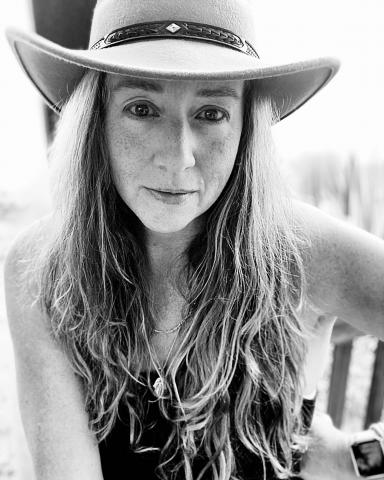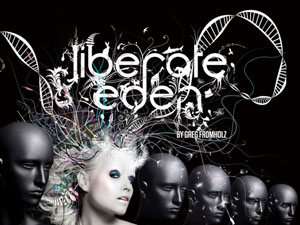
Cathleen Falsani is a longtime religion journalist and author of six nonfiction books. You can follow her on Twitter @godgrrl and read more of her work via The Numinous World.
Posts By This Author
A.M. Giggle: Cookie Waits does 'God's Away on Business'
Some clever folks have created a magnificent "mash-up" of Sesame Street's resident pastry enthusiast, Cookie Monster, and the iconoclastic performer Tom Waits' song "God's Away on Business" from his 2002 album, "Blood Money." (Waits' song also appeared in the 2005 film, Enron: The Smartest Guys in the Room.)
Surprised by Joy on 9/11/11
Obama's Remembrance: 9/11/11
Obama on Jobs Act: 'They don't have the luxury of waiting 14 months.'
First, here's the transcript portion of the last five minutes of President Obama's speech where he really got his preach on:
Liberate Eden: A Digital Meditation on the Contemporary Life of Faith
 "The man who can articulate the movements of his inner life," the late Christian apologist and author Henri Nouwen said, "need no longer be a victim of himself, but is able slowly and consistently to remove the obstacles that prevent the spirit from entering."
"The man who can articulate the movements of his inner life," the late Christian apologist and author Henri Nouwen said, "need no longer be a victim of himself, but is able slowly and consistently to remove the obstacles that prevent the spirit from entering."
Throughout the ages, how Christian believers have chosen to articulate their inner lives has had many manifestations in literature, music, architecture, and other artistic endeavors.
As a means of communicating and wrestling with his inner life -- his journey of faith -- Greg Fromholz, an American expatriate youth worker for the Church of Ireland in Dublin, wrote a book titled Liberate Eden, but traditional publishing houses found that his work was a bit too iconoclastic for their tastes.
"It is just too different to be Christian," one publisher pronounced.
10 Years After 9/11 the Question Remains the Same
On the morning of September 11, 2001, I was standing in the bathroom of my apartment outside Chicago, about to hop in the shower, when I heard the phone ring and then my husband call my name.
"It's Roger from the desk," he called, sleepily, invoking the name of the morning assignment editor at the Chicago Sun-Times where I was a reporter at the time.
I padded down the hallway in my pajamas to the living room and picked up the phone.
"How quickly can you get down here," Roger asked.
"I dunno, an hour, maybe," I said. "Why? What's up?"
"A plane hit the World Trade Center in New York," he said. "They think it's a terrorist attack."
The Problem With Christian Labels
A week or two after the 2004 election, I was dining with some friends in New York when the conversation turned to religion and politics -- the two things that you're never supposed to discuss in polite company.
George W. Bush had just been re-elected with the help of what was described in the media as "evangelical voters." And knowing that I am an evangelical Christian, my friends were terribly curious.
"What, exactly, is an evangelical?" one gentleman asked, as if he were inquiring about my time living among the lowland gorillas of Cameroon.
I suddenly found myself as cultural translator for the evangelical mind.
"As I understand it," I began, "what 'evangelical' really means is that a person believes in Jesus Christ, has a personal relationship with him and because of that relationship feels compelled to share their experience of God's love with other people. "How they choose to share that 'good news' with others is entirely up to the individual. Beyond that, the rest is details and style."
Mustard Seed Power
Even the weakest faith can give us the strength to move mountains -- or climb them.
Love Wins: My Interview with Rob Bell
Is Evangelical Christianity Having a Great Gay Awakening?
Kennedy and Obama: The Faith Question
A change in faith culture for the head of state
Jan. 20, 2011, marks the 50th anniversary of the inauguration of President John F. Kennedy, our nation's first (and still only) Roman Catholic head of state. At the time, Kennedy's Catholicism was a matter of great public debate and, in some quarters, great alarm.
What did it mean to the presidency to have a "papist" sitting in the Oval Office? Would his first allegiance be to the pope rather than the American people? Collective hand-wringing ensued. But no one doubted whether Kennedy was what he said he was: a Catholic.
Half a century later, interest in the president’s spirituality has not waned. The religious predilections of our current president, Barack Obama, the nation’s first African-American president—and the only U.S. commander in chief to have familial ties, however tenuous and nominal they may be, to the Islamic tradition—is perpetual fodder for heated debates in the public square.
But something has changed since Hatless Jack took the oath of office. Today, some don't believe the president when he says what he believes about God. It is a troubling progression.
Nearly seven years ago, I sat down with Obama, then a young state senator running for national office for the first time, for a lengthy interview about his faith. When my "spiritual profile" of Obama ran in the Chicago Sun-Times, it was greeted with modest interest, mostly for the novelty of a Democratic candidate speaking at length about religion. To date, that interview remains the most exhaustive Obama has granted publicly about his faith.
Together in Imperfection
For more than 15 years, I didn't go to church (except for lots of visits in my professional capacity). When I was in my early 20s, the Episcopal church I attended regularly split.
The Dragonfly Abides
An Open Letter to Madonna
Social Justice is a Virtue
Why Character Matters
Human Failing and Easter Grace
Four Friends' Perspectives on Tiger Woods' Buddhism
Apart from the Dalai Lama, who reportedly had never heard of him until earlier this week, Tiger Woods is the most famous Buddhist on the planet.
But until Woods invoked his Buddhist identity during a televised mea culpa for cheating on his wife and a spectacular fall from grace, like most of his fans, I had no idea the golfer was a follower of the Eight Fold Path.